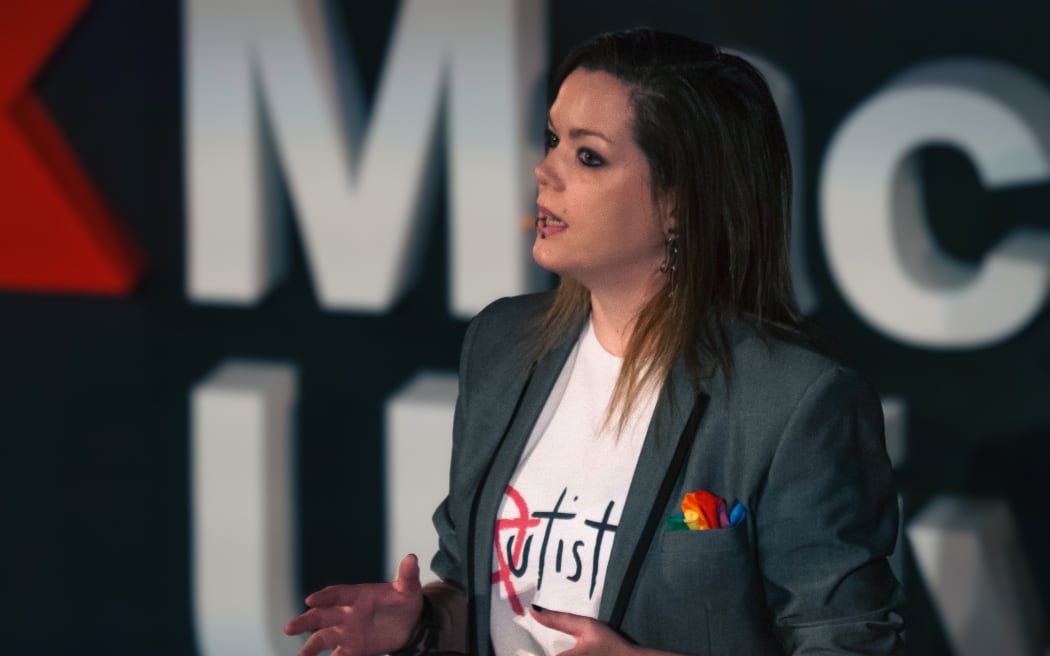
Jac den Houting giving a TED Talk in 2019 Photo: Jac den Houting
When an autistic and a non-autistic person have a social interaction, there's an assumption that if the former is doing it "right" the latter must be doing it "wrong," says research psychologist and autism activist Dr Jac den Houting (they/them).
It's too easily forgotten that autistic people work just as hard to understand non-autistic people and when there's miscommunication both sides are contributing to it, Dr Houting tells Kim Hill.
Autism New Zealand provides a guide to getting an autism diagnosis here.
An autism diagnosis is often regarded as a serious setback, but Jac Houting was relieved to get their own at 25.
Before this, they'd had a lot of trouble with planning, memory, organisation, sometimes known as "adulting", and also figuring out how to establish and maintain friendships.
"I spent a lot of my life before diagnosis just feeling out of place and like I didn't really quite fit in, like I was a bit broken, there was something wrong with me but not having a name for that."
After being diagnosed as autistic in 2011, Jac spent a couple of years learning about the "huge" autism community and culture online.
Now their work - including the hit 2019 TED Talk Why everything you know about autism is wrong - is about encouraging people to update their presumptions and perceptions about what it means to be autistic.
Everyone has different personas in different environments, but autistic people often have to hide core parts of themselves when they're out in public, Jac says.
"For an autistic person, the public-facing mask that we adopt may bear almost no resemblance to the person that we are when we're not masking.
"The public-facing me bares very little resemblance to the me at home who struggles to do the most basic things sometimes."
Jac says they rarely feel safe and comfortable out in the world due to "sensory assaults" which range from annoying to physically painful and dangerously distracting and struggles with conducting conversation.
"I find it quite difficult to translate the thoughts inside my head into words that coalesce into sentences and make sense in a way that other people will understand and express the ideas that I want to express.
"I'm quite lucky that the level I can communicate at is enough to get me by. But I would really love to know what I could achieve if I could actually communicate in a way that presents what's going on in my head."
Every autistic person has different strengths and challenges, and the community rejects its members being labelled as either high or low-functioning, Jac says.
"It's really deceiving to label someone high-functioning or low-functioning autistic because they may have really significant challenges in one area but they may also have real abilities in another area."
Autistic people given the "high-functioning" label may not get the support they need while those deemed to be "low-functioning" are less likely to find education and employment opportunities.
"Rather than thinking of the autism spectrum as a line, I encourage people to think of it more as a colour wheel or a constellation - something a bit more circular and something that is made up of a range of different individual components."
Jac says each individual experience of autism can be viewed as a unique tuning of levels on a music mixing board.
To create an environment that's more inclusive and accessible for people with the condition, they say public amenities and services need to be redesigned from the ground up.
Supermarkets don't need to have fluorescent lights installed, for example.
"They could be built with a much nicer, sensory-friendly form of lighting and not just at people would benefit. I don't imagine there are many people out there who enjoy the glare of fluorescent lighting.
"I don't think anyone really benefits from or enjoys the beeping of cash registers and scanners at supermarkets. Surely they could be designed from the ground up in a way that is less confronting from a sensory perspective.
'Why do we still build buildings with stairs as the main form of access and a ramp around the side? A ramp is typically going to be accessible for everybody."

